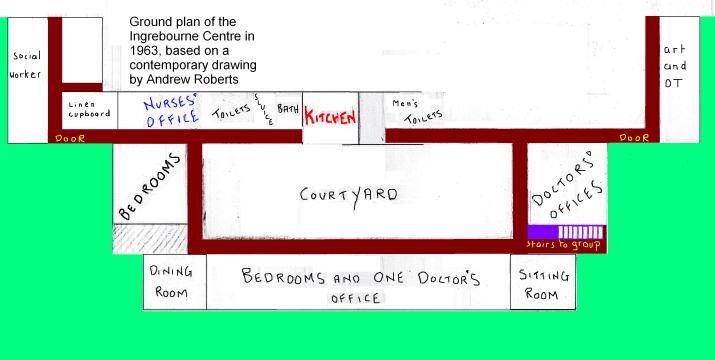Friday 5.7.1963
In Friday's morning group, a women [Yvonne] talked about extra sensory
perception of deaths. The doctor suggested she was merely expressing a
desire that these people would die, but her dignity was greater than his as
if the experience had been too strong to be dismissed so easily.
The Friday afternoon meeting was called "Jobs Advisory Committee". All the
"committees" were open to everyone, but less people attended than attended
the morning group and doctors were not present. I was, apparently, welcome
at the Jobs advisory although I still had a job. This was the committee
where the outside world intruded poignantly. It was the committee where
mentally unstable people discussed and sought advice on the constant
rejections that they met looking for employment. To receive treatment in a
neurosis centre is a brand. Many who saw Ingrebourne as an organisation
they were proud to be associated with admitted to prospective employers
that they had had mental disorders, but the social workers were more
realistic and advised us not to mention our illness.
Friday 5.7.1963 evening
CND. Civil Defence debate at Friends Meeting House, Billericay.
###
Twice a week we had an afternoon period devoted to painting. As
counterbalance to the destruction of analysis, I felt it was essential to
strive to create in these groups rather than use them as an extension of
analysis. I chose to paint the most hopeful moment of my dead romance: a
picture of myself and [Mary] sitting in a sunlit glade of a wood talking.
I was fresh then and I wanted to say simple things. I wanted to say how
beautiful love had been.
###
[Valerie] struggled to act as secretary to one of the committees, but could
not stand the criticism in a group when her minutes were presented.
"I can't do it, I can't do it"
she shouted, the tears flooding her face. Some of the patients harried her
and she cried even more.
"Why can't you leave her alone", I demanded, "What good is it going
to do driving her frantic?"
Dr Barker wanted to know, when he saw me next, why I needed to help lame
dogs over styles. The question was a mis-conception.
[Valerie] was not the only one they said I defended. There was Margorie to.
Every Wednesday we had "House Committee" at which the practical running of
the unit was discussed. Two girls always used this meeting to accuse
Margorie of drinking too much milk. They were Irish, with string tongues,
and the other patients shied before their onslaught and left Margorie to
get herself hysterical.
